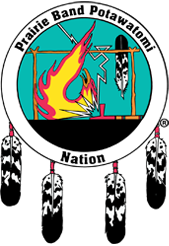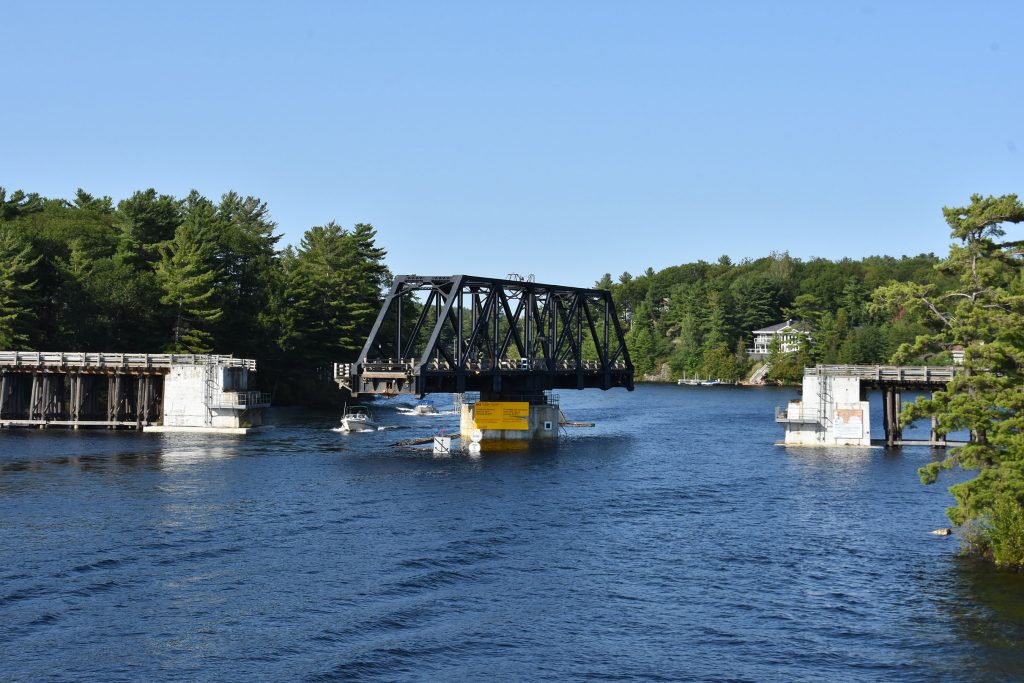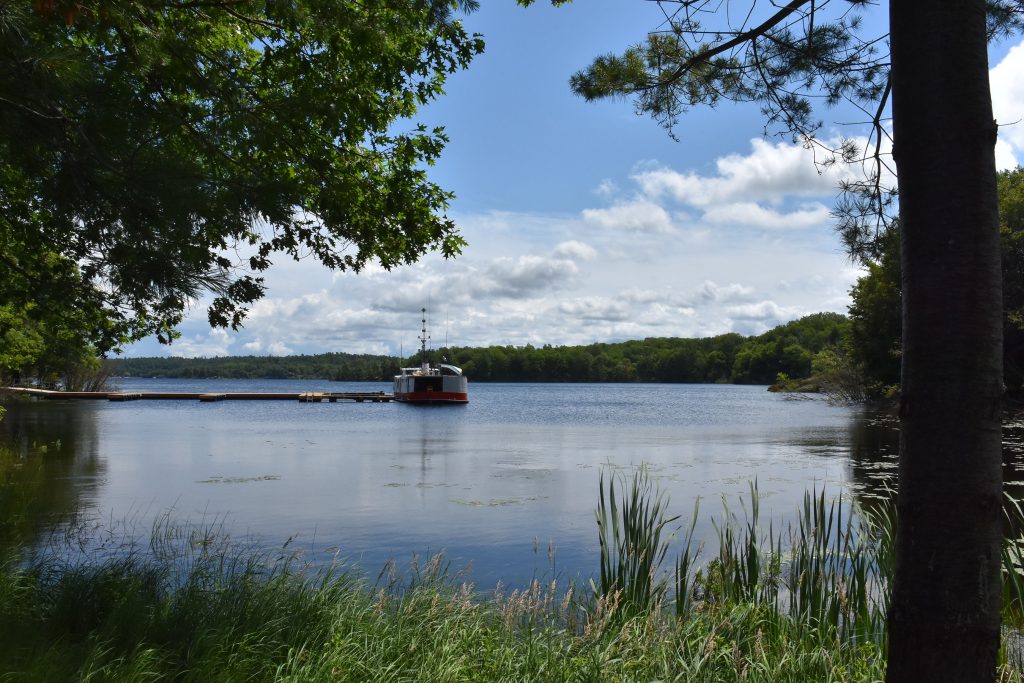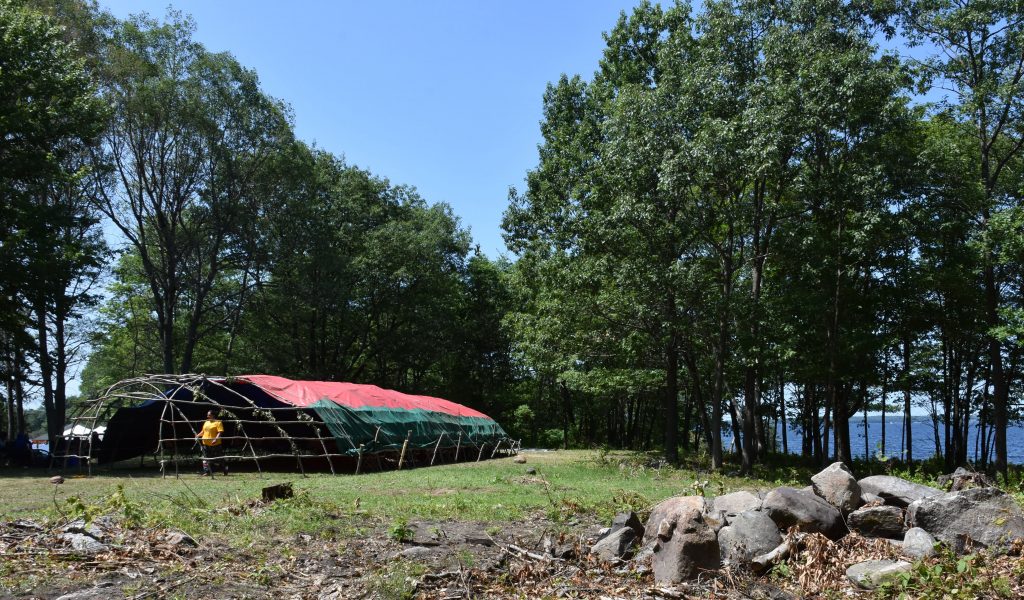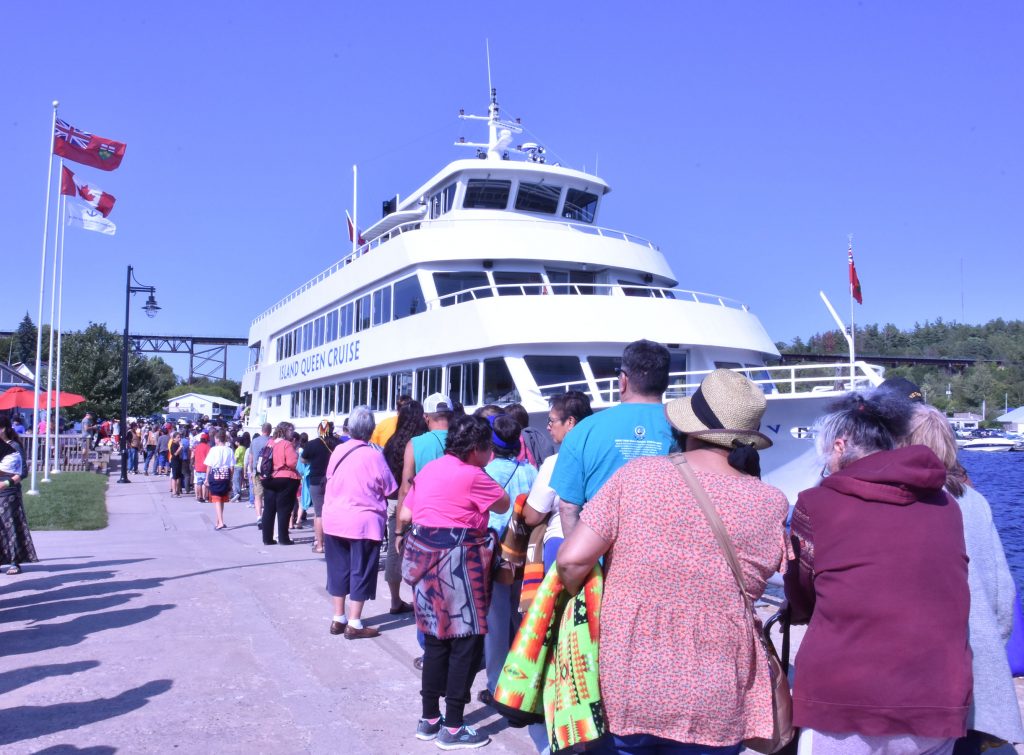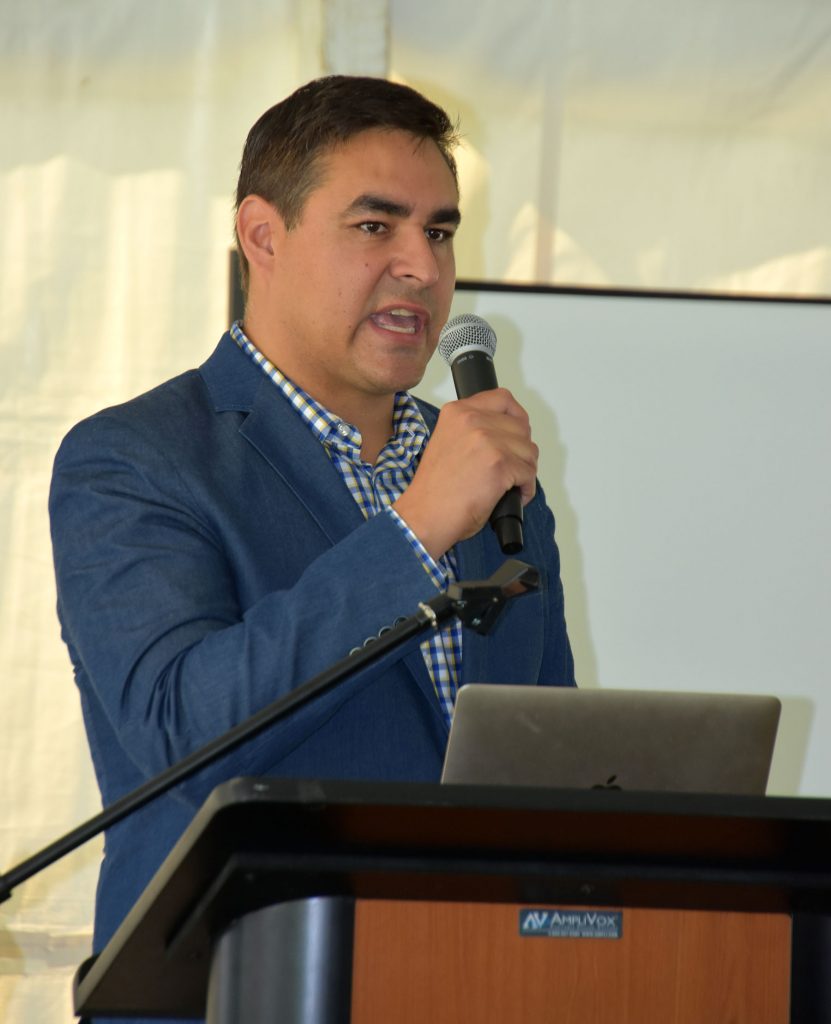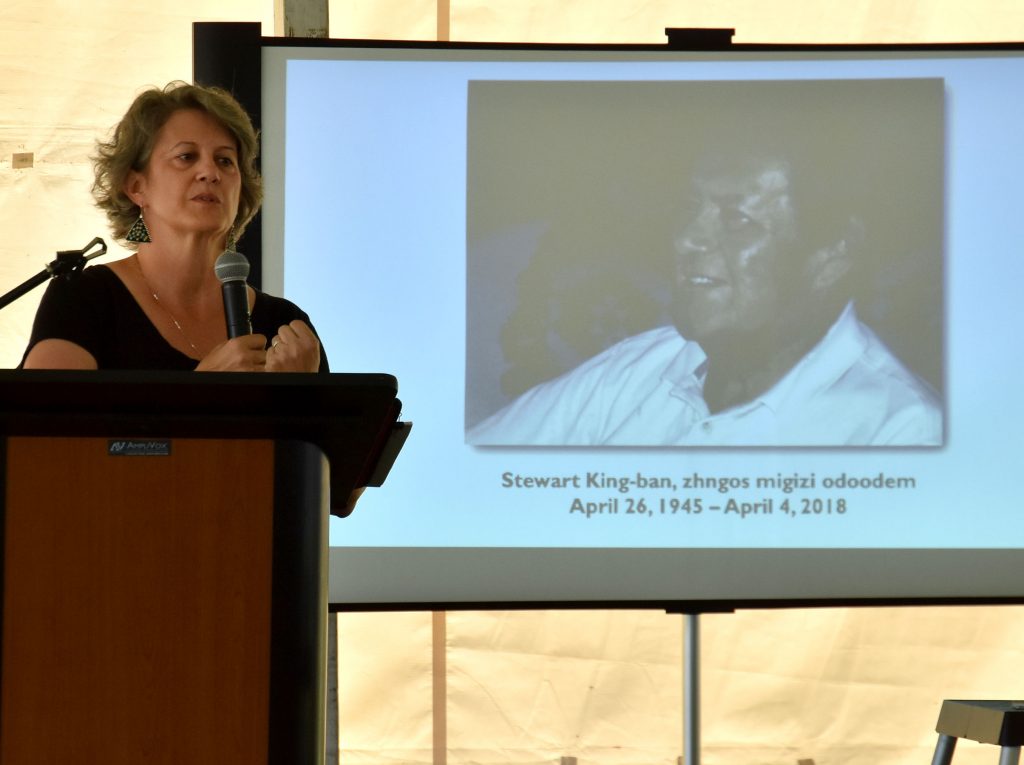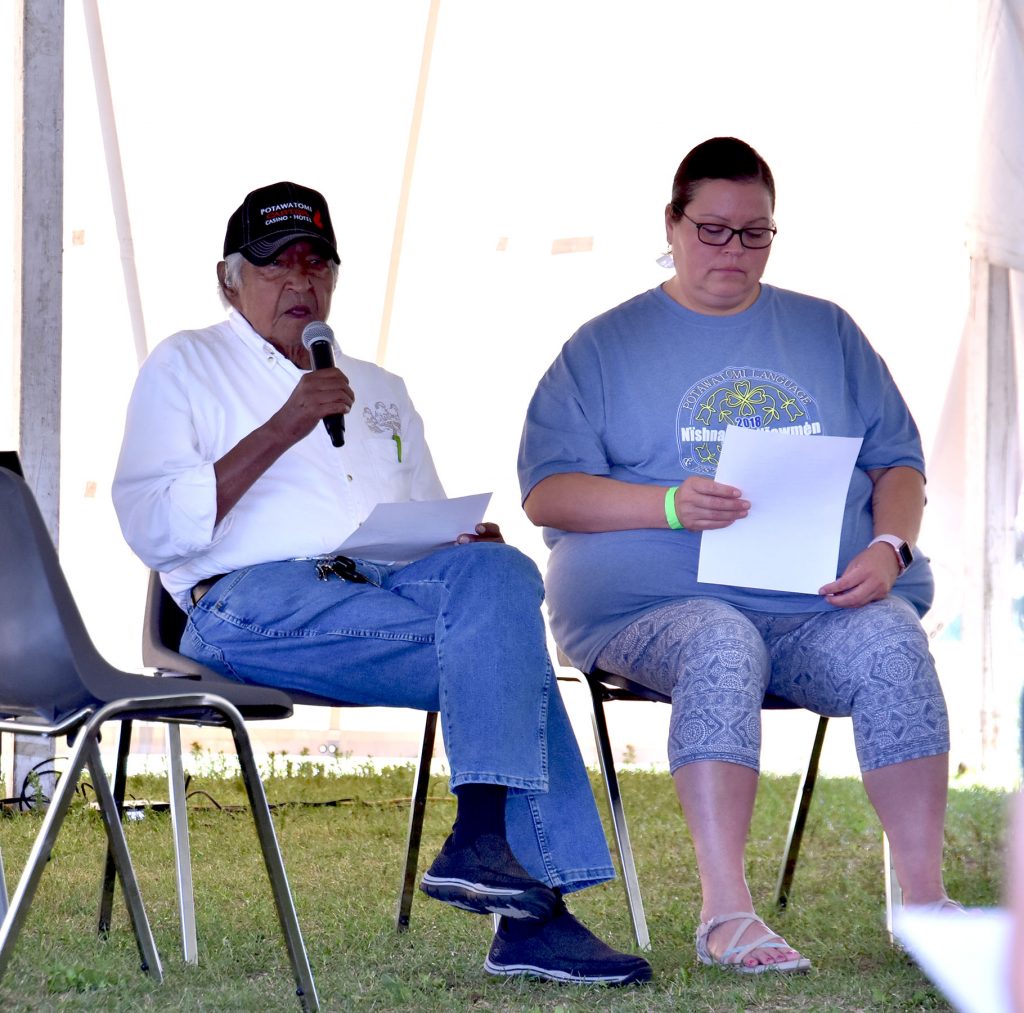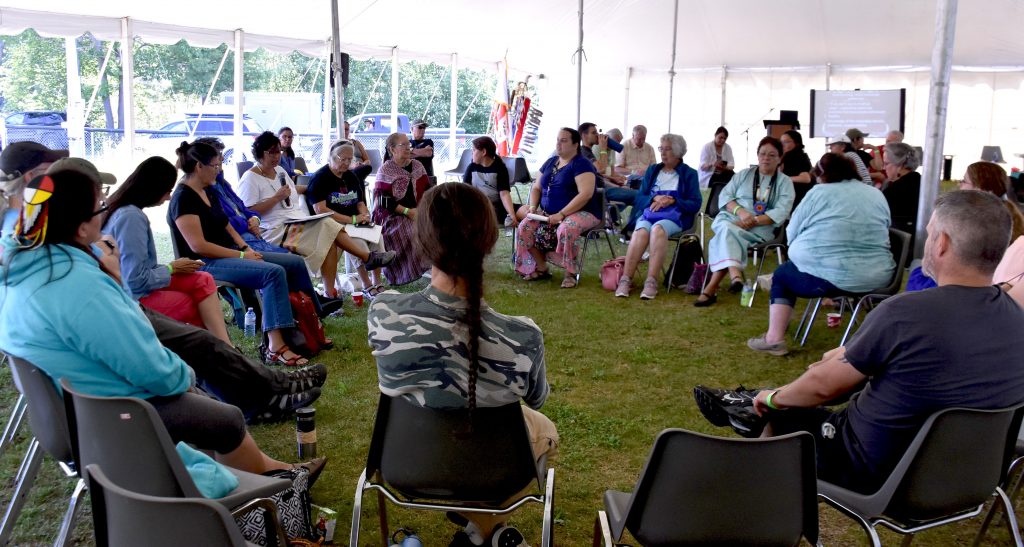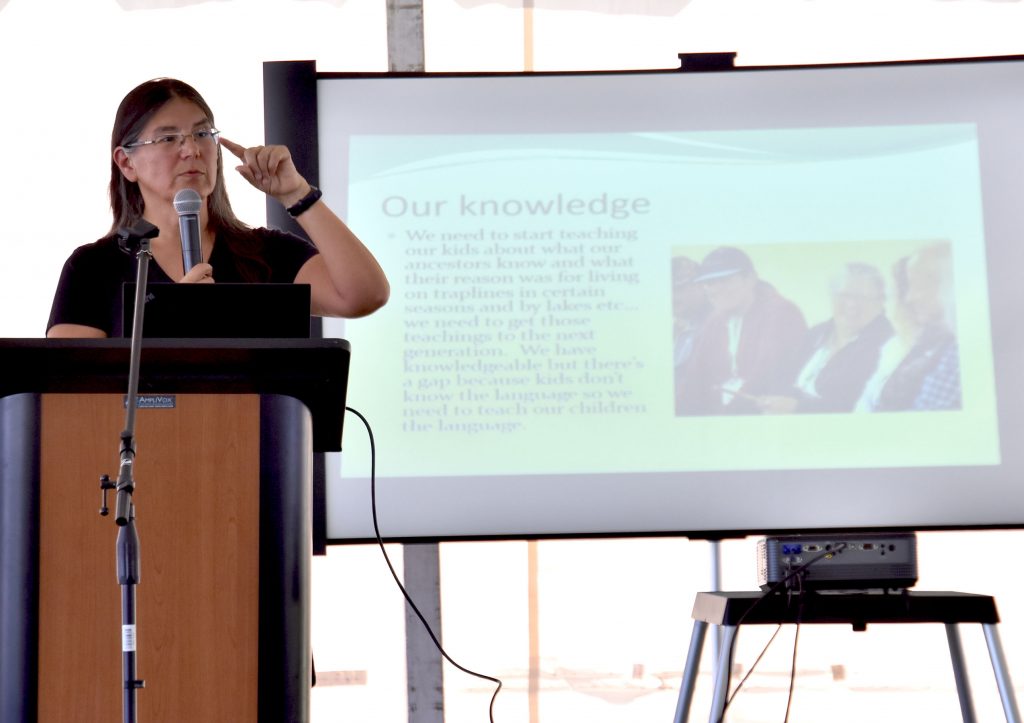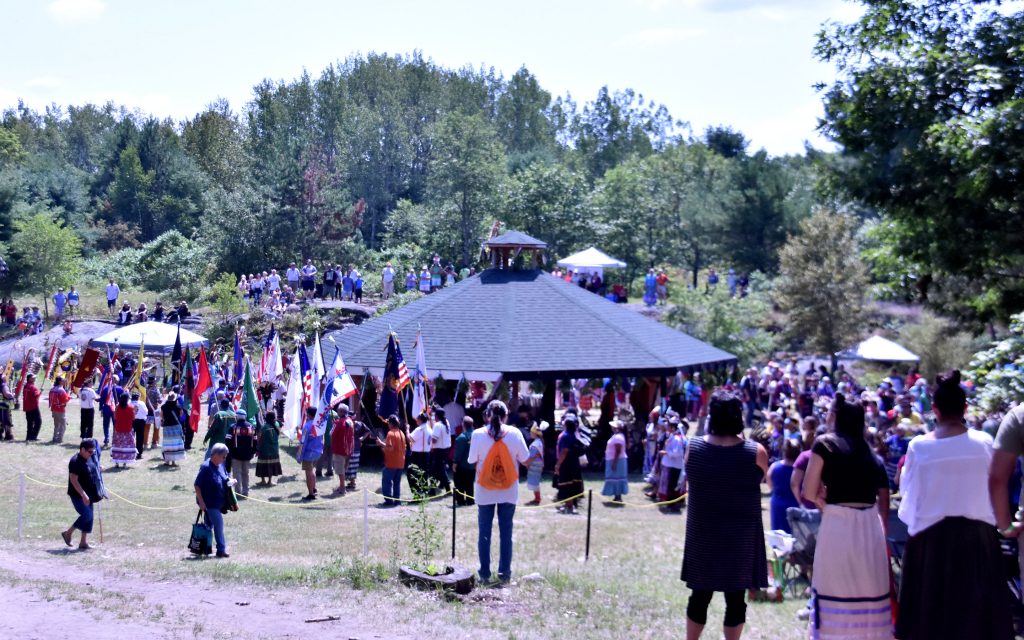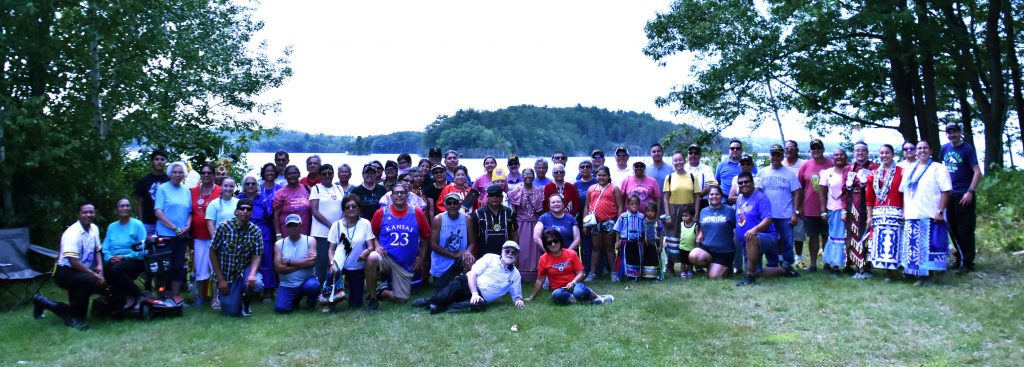
A group photo of the Prairie Band Potawatomi Nation members that attended the 2019 Potawatomi Gathering on Saturday, August 3, 2019.
8.13.19
BY: Michelle Simon
The 26th Annual Potawatomi Gathering was hosted by the Wasauksing First Nation on July 30 through August 4, 2019. The greater Potawatomi Nation converged on Parry Island, located in the Georgian Bay of Ontario, Canada this year to celebrate the Potawatomi way of life, language, culture, art, and environment.
This year’s event consisted of a two-day Language and History Conference on Tuesday, July 30, and Wednesday, July 31, 2019, along with a Youth Conference which ran from July 30 through Friday, August 2, with the actual Gathering starting on Thursday, August 1 with an opening ceremony and concluding on Sunday, August 4, 2019, with the passing of the ashes.
The Wasauksing First Nation is headquartered on the second biggest island within the Georgian Bays’ 30,000 island region which is the largest concentration of freshwater islands in the world. To reach the Gathering activities all travelers had to cross the Wasauksing Swing Bridge, which opens every hour on the hour to allow larger boats through the South Channel.
Most activities were staged on Geewadin Road near the Wasauksing First Nation Community Complex, or three miles away at Depot Harbour. Both locations were near the island’s edge with accessibility to the waters of the bay.
The Wasauksing Rink on Geewadin Road was set up with tables and used for dining throughout the week as catered meals were provided for breakfast, lunch, and dinner. Vendors placed their stands to the west side of the rink, while a large white tent was set up on the eastern side. The white tent was utilized for portions of the Language and History conference and cultural classes and served as a general meeting place throughout the week. Beside it, the baseball field was used to host Zumba and Anishinaabe Lacrosse. And right beside the field, was a small inlet with a dock where children swam throughout the week and fisherman Guy Nadjiwon provided tours of his fishing boat, which was used to catch fish from Neyaashiinigmiing that were served during the Gathering.
Depot Harbour was utilized for the Youth Conference, Gathering breakout sessions, parking and the traditional powwow over the weekend. On Tuesday, youth foraged the area for materials to build a lodge and on Wednesday, they put together an approximately 70-foot long lodge covered by a tarp with the Midewiwin society colors which was also used for Gathering activities during the week. A sweat lodge was also held at the Depot Harbour area.
A few events took place off the island, including a 3-hour boat tour of the shoreline of Parry Island and the Bay’s remote outer islands on the Island Queen Cruise ship. On both Wednesday and Thursday, cruises were provided to Gathering attendees allowing them to see the natural beauty and splendor of the area. A hike also took place at Rose Point Trail, just across the bridge on the mainland and youth were shuttled to a Horse Therapy Program off the island on Thursday.
The Language and History Conference began with an impassioned speech by Brian McInnes, “Gaagge Boodewaadmiiwiying” – “We are forever Potawatomi.” McInnes is a Wasauksing First Nation member and tenured professor in the School of Human Ecology at the University of Wisconsin Madison. During his talk, McInnes asked not to be recorded while he said a few prayers and kind words in his native language. This set a tone that flowed throughout the Gathering and flows throughout the teachings of Anishnaabe people in general. This sentiment was echoed by Jim Thunder later in the day, “not everything is meant for the internet.” It was a reminder to everyone that some things are meant only for those who are in attendance, those who are present.
The speech was followed by morning breakout sessions on the topics of Embracing dialect differences, the Potawatomi migration, Pokagon language through technology, Transitive inanimate commands, and a Language nest.
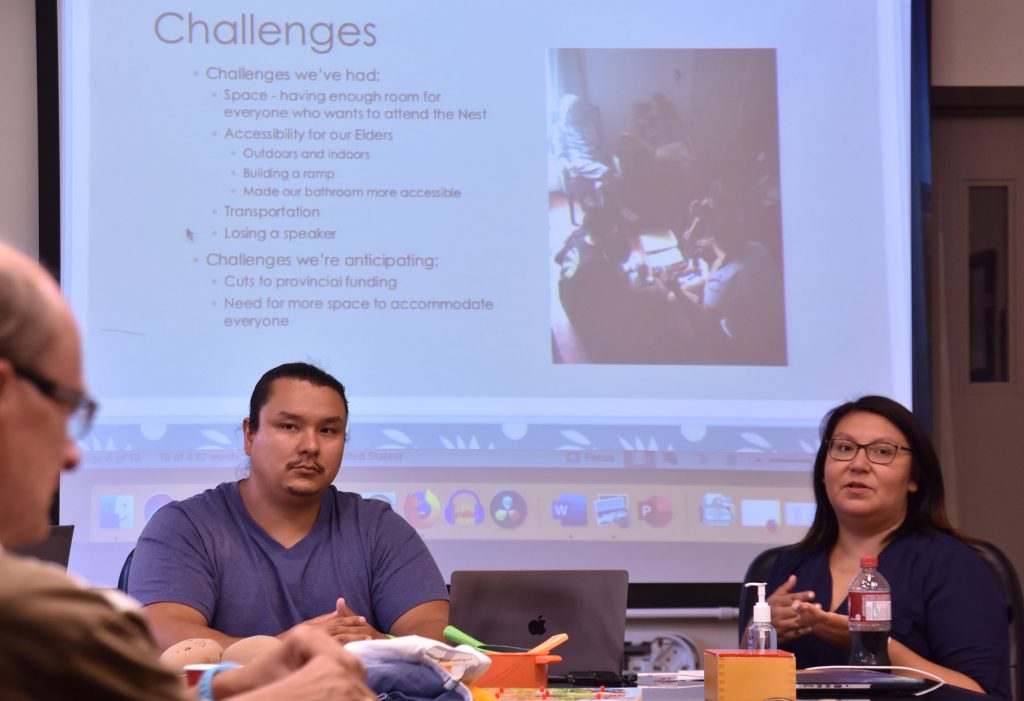
Chance and Mariah King, Wasauksing community members, share their experience of creating a language nest during a breakout session.
In the afternoon, attendees gathered once more under the tent for an honoring of Stewart King-ban. In life, King-ban had been instrumental in the creation of the Potawatomi Gathering and he was rich in culture and Anishinaabemowin, a language blend of Ojibwe, Odawa and Potawatomi used near the Great Lakes and in Canada. King-ban spent much of his life sharing his experiences and traditional knowledge with all peoples, and he was committed to the revitalization of the Bodwewaadmii language regularly presenting at tribal language conferences. King-ban passed away on April 4, 2018. During his honoring, members of the community and those who knew him well shared personal stories of King-ban.
Afterward, the second set of language breakout sessions were held, and the day closed with a language session from Jim Thunder, of the Forest County Potawatomi.
Day two of the Language and History Conference focused on Protecting Potawatomi Plants and Plant Knowledge and was led by a presentation from Dr. Robin W. Kimmerer, of the Citizen Potawatomi Nation. Dr. Kimmerer is a professor of Botany and Director of the Center for Native Peoples and the Environment at the State University of New York and is the author of “Braiding Sweetgrass: Indigenous Wisdom, Scientific Knowledge and the Teachings of Plants.”
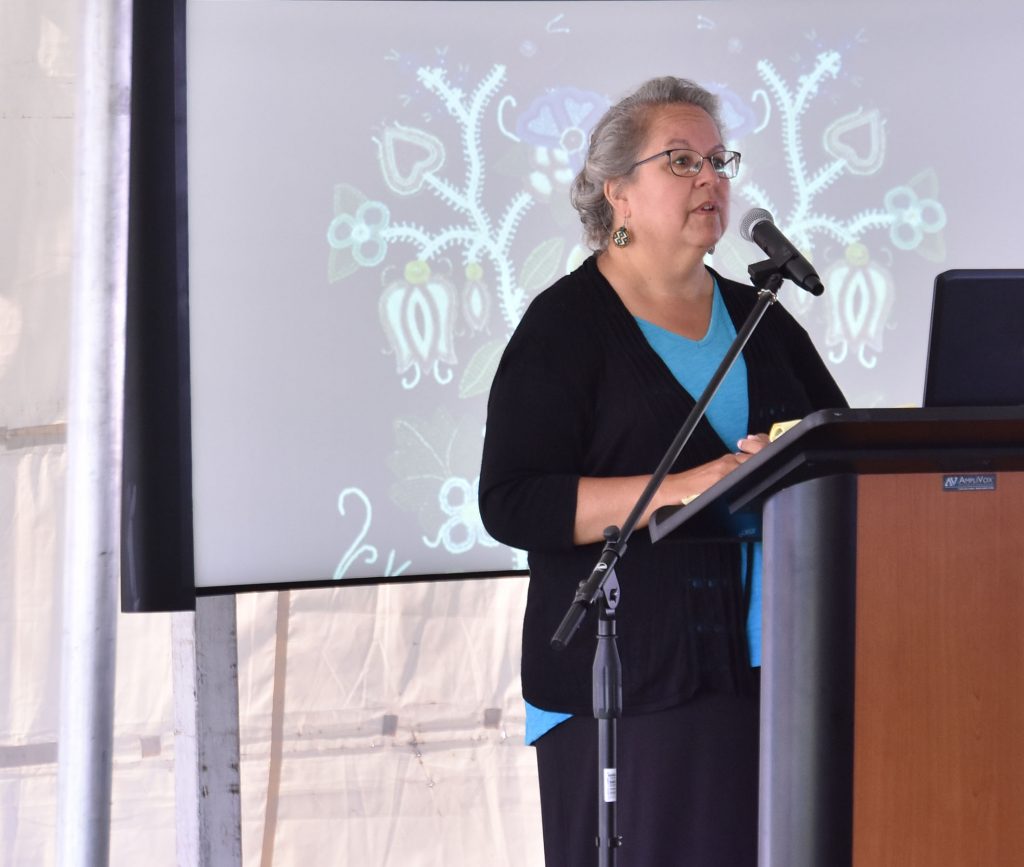
Dr. Kimmerer shares information about the plant nations and the Potawatomi peoples’ relationship with them.
Kimmerer spoke of plants as teachers and recalled how the Potawatomi have long relied on plants and plant knowledge to survive, and how as the bands migrated, they had to learn new plants and new ways of working with them. She also spoke about the rapid climate change we are currently living in, giving an example based on scientific models that by 2070 the Sugar Maple tree could be extinct. She then called on the group at large to break down into smaller groups and discuss what the Potawatomi people can do to give back and protect culturally significant plants now, in a spirit of reciprocity.
The breakout groups discussed the status of their individual environments, with many sharing stories of increased intense weather and altered precipitation and seasons regardless of their home locale. The groups also brainstormed multiple ways to assist the plant nations, ensuring plant knowledge is being shared in communities was voiced several times. The information generated by the groups was collected and shared at the tribal governance meeting later in the week.
The afternoon session led by Deborah McGreggor, “Potawatomi & Climate Change Adaptation,” was very similar to the morning session. McGreggor is a member of the Whitefish River First Nation of Birch Island, Ontario and a professor at York University in Toronto focusing on Indigenous knowledge systems and their various applications in diverse contexts including water and environmental governance.
McGreggor reminded the crowd that throughout time Potawatomi cultural stories have informed how to deal with climate change and as a people close to the natural world the Potawatomi should expect to experience the impacts of climate change firsthand.
A film screening of “Striking Balance” was held in the late afternoon at the Georgian Bay Biosphere Reserve. The film about the Georgian Bay explores the struggle to mitigate the impact of cottagers (which is the Ontario way of referencing summer vacation houses) and a new highway on the region’s endangered species.
Thursday, August 1, was the start of the Gathering which began with an opening ceremony at Depot Harbour and commenced with morning and afternoon cultural workshop sessions, a golf tournament in Seguin Valley, a guided hike with the State of the Bay Report and a trip to a sacred site. PBPN members Cindy and Dawn “Sogi” LeClere taught a workshop on Bias Beadwork. Other workshops included Applique Ribbon Work with Peggy Kinder, Baby Moccasin Making with Deborah King, Geneaology with Clayton King, Tulip Bags with Veronica Rice, Corn Curing with Dan Kimewon and a Wiigwaas (Birch Bark) presentation with Kevin Finney.
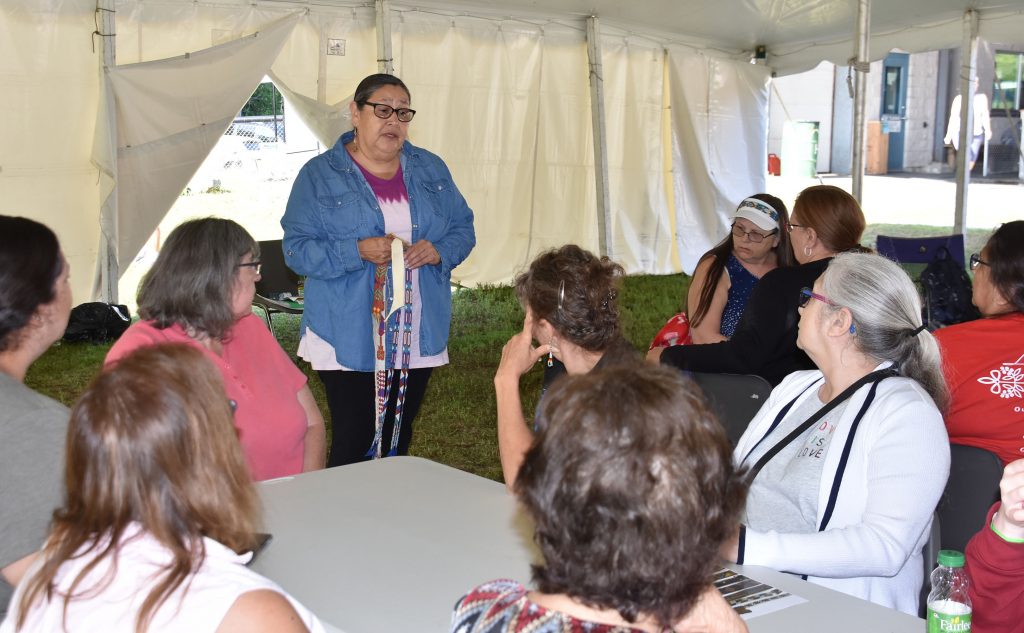
Prairie Band Potawatomi Nation tribal member Cindy LeClere talks to participants of her workshop about bias beading before providing a hands-on tutorial.
Friday, presented another opportunity for friends and family to visit and take part in morning and afternoon cultural workshop sessions, go on a Maple Sugar Bush Walk, visit the museum on Tower Hill in Parry Sound to see an exhibit of quillwork, and watch another film screening, this time for “Sounding Thunder,” a video of a concert performance featuring Brian McInnes and Jodi Baker, with the second half a documentary on making the project. The film is a musical journey into the life of renowned Ojibwe World War I sniper and decorated officer of the Canadian military, Francis Pegahmagabow.
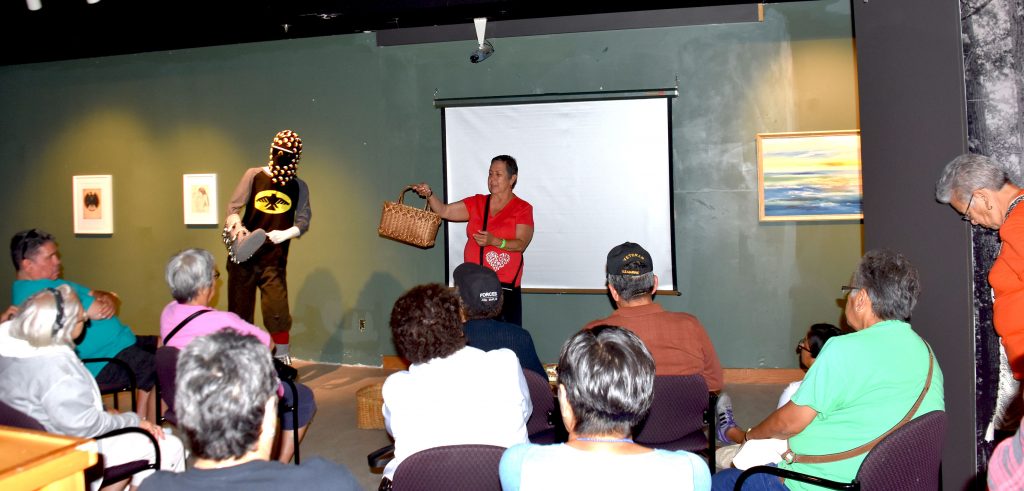
Prairie Band Potawatomi Nation elders visited the quillwork exhibit at the Tower Hill museum located in Parry Sound. Ms. Rice shares her family history of basket making.
The evening concluded with a Powwow Warm up, with host drum Whitefish Bay Singers, and the selection of the new Miss Potawatomi and the newly created, “Shkaabewis.” Shkaabewis is a new role intended for young Potawatomi males that are helpful in their community. Four young women and four young men vied for each position, including Wyatt Boswell, PBPN. In the end, Kateri Phillips, Citizen Band Potawatomi was selected as the 2019-20 Miss Potawatomi and Cole Green, Wasauksing First Nation, was selected as the first Shkaabewis for the 2019-20 term.
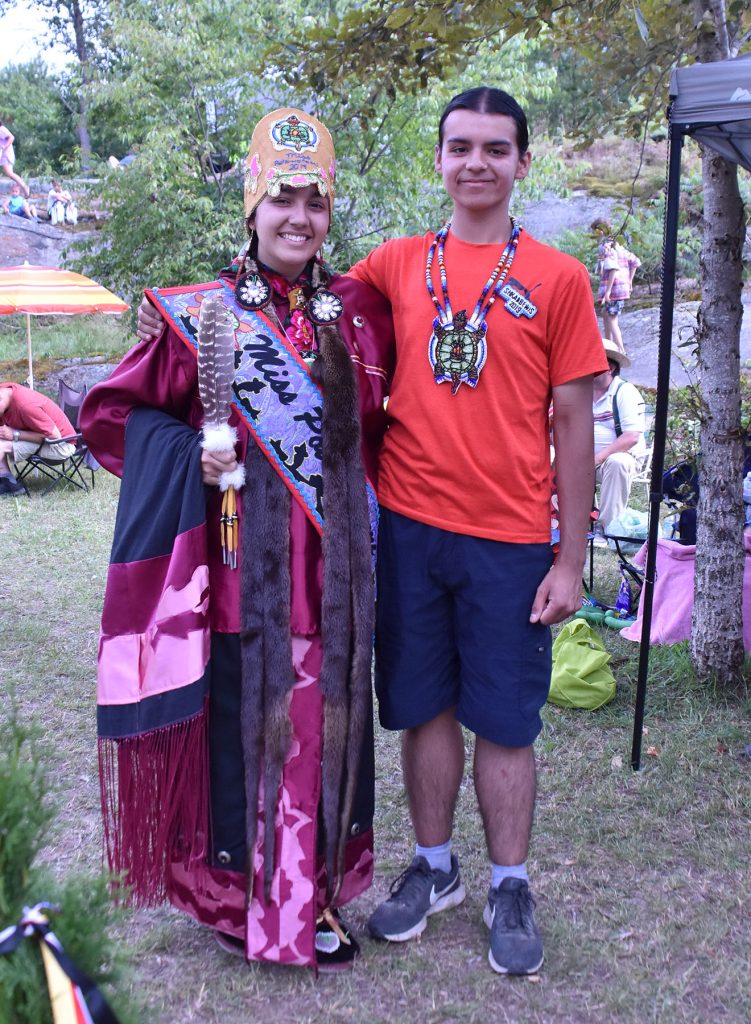
2019-20 Miss Potawatomi Kateri Phillips and Shkaabewis Cole Green on Saturday at the traditional powwow.
On Saturday, everyone headed to Depot Harbour to take part in the traditional powwow with a grand entry set for noon. Despite a week of temperatures in the mid to upper 80’s, Saturday was hot with the sun high overhead the small arena. At the conclusion of the honor songs, PBPN veterans Benny Potts and BJ Darnall were escorted out of the arena due to the heat.
The powwow commenced with several exhibition songs. Dancers dressed in full regalia received day-pay of $30 Canadian. During the session, the 9 bands held their giveaways. The Prairie Band Potawatomi Nation gifted the Wasauksing community a mounted bison head, along with a bison robe and a couple of bison skulls. The PBPN elders distributed giveaway items to those in the crowd.
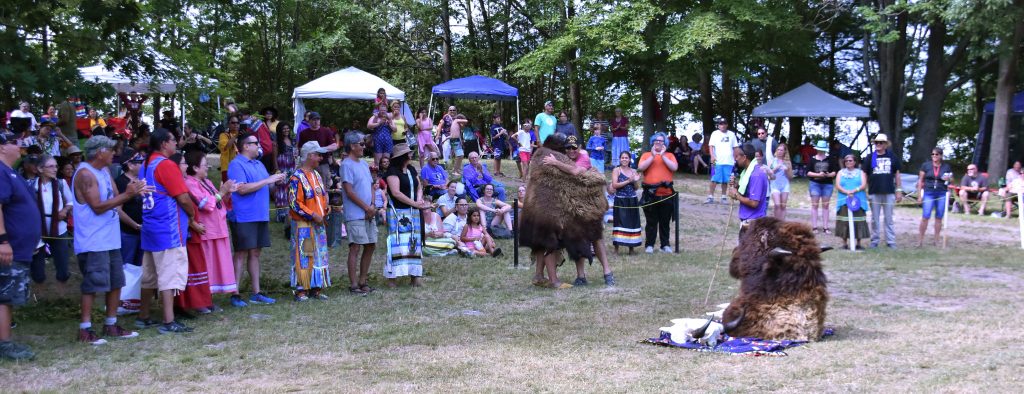
Prairie Band Potawatomi Nation Chairman Joseph Rupnick embraces Wasauksing Chief Warren Tabobondung during the giveaway.
Several vendors were set up around the grounds, including PBPN members Joseph Kabance, who traveled from New York state to take part, and Jackie Mitchell, traveling from Prairie Band Potawatomi Common Land in Kansas. And for some brave souls that attended, an outcrop of rock referred to as the cliffs were used by young and old to jump off into the cool waters of the Georgian Bay for a swim.
After the traditional powwow concluded, gathering attendees were treated to a concert by Digging Roots, with singer Shoshona Kish and band member Raven Kanatakta. The duo utilizes traditional and contemporary practices and is influenced by a broad and diverse music community, their music can be found on YouTube. The evening ended with a firework display at the rink.
Sunday, August 4, was the final day of the Gathering and a second day for the traditional powwow. During the session, the passing of the ashes occurred announcing the Hannahville Potawatomi, of Wilson, Michigan as the hosts of the 27th Annual Potawatomi Gathering in 2020.
The 2019 Potawatomi Gathering was yet another successful event allowing for the strengthening and revitalization of the Potawatomi people, their culture, language, and ways. As time marches forward, the 9 recognized Potawatomi bands along with those found along Lake Huron, the Georgian Bay, Cape Croker, Christian Island, and Manitoulin Island and beyond can be certain that the Potawatomi will remain forever.
- Visit Prairie Band Potawatomi Nation on Facebook to see more photos!
